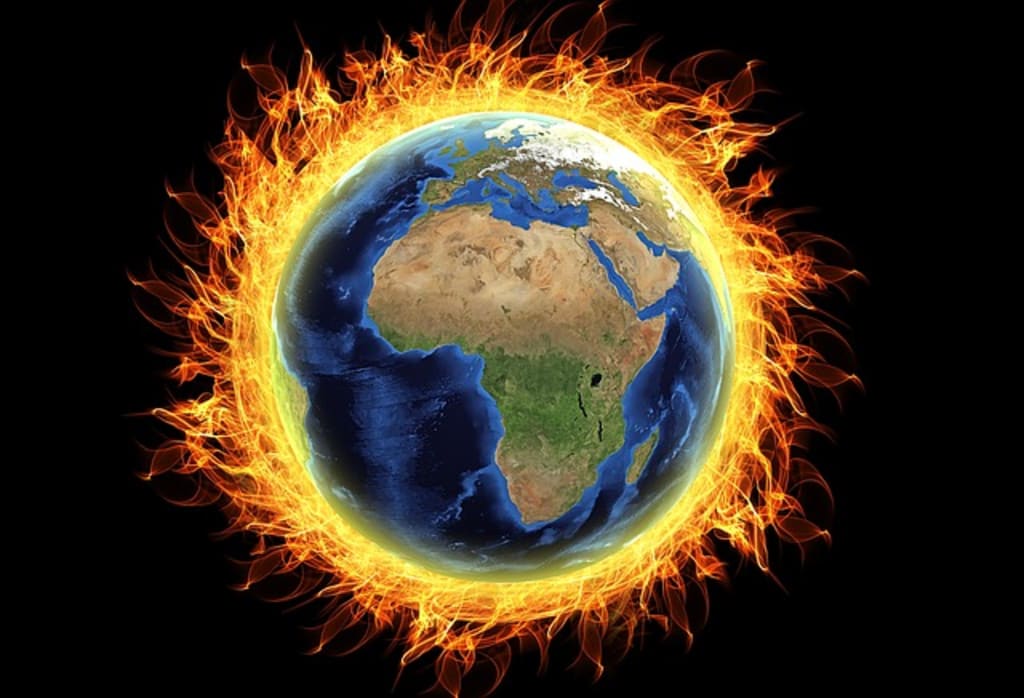The Urgency of Addressing Global Warming: A Call for Collective Action in artical
global warming

Worldwide warming has emerged as one of the most pressing demanding situations of our time, with a ways-achieving effects for our planet and future generations. The Earth's common temperature has been gradually rising because of the accumulation of greenhouse gases in the surroundings, ordinarily due to human activities. The urgency to deal with worldwide warming has by no means been extra, and it is essential that we take collective movement to mitigate its effect and make sure a sustainable future for all.
The science behind global Warming:
This section will delve into the clinical understanding of world warming, explaining the greenhouse effect, the role of human activities in increasing greenhouse gasoline emissions, and the resulting rise in global temperatures. It will provide a top level view of the evidence helping the life and acceleration of global warming, together with temperature information, melting ice caps, and excessive weather events.
Environmental and Ecological impacts:
Worldwide warming has a ways-attaining effects for our environment and ecosystems. This section will discover the influences on diverse herbal structures, consisting of rising sea tiers, lack of biodiversity, disruptions in climate patterns, and the intensification of herbal screw ups. It's going to highlight the vulnerability of coastal regions, coral reefs, forests, and natural world habitats to the changing weather.
Societal and economic Ramifications:
International warming poses enormous risks to human societies and economies. This segment will speak the social and monetary effects, including meals and water shortage, displacement of populations, improved fitness risks, and monetary disruptions. It will emphasize the disproportionate effect on vulnerable communities and the need for equitable answers to deal with climate alternate.
Mitigation strategies:
Addressing global warming requires a multi-faceted technique. This phase will discover numerous mitigation strategies that can help lessen greenhouse fuel emissions and restriction international temperature rise. It's going to talk the significance of transitioning to renewable energy sources, promoting power performance, adopting sustainable agricultural practices, and improving woodland conservation efforts. Additionally, it's going to comment on the significance of global cooperation and policy frameworks like the Paris settlement.
The function of people and Collective motion:
People, groups, groups, and governments all have a function to play in combating worldwide warming. This section will spotlight the importance of individual moves, inclusive of decreasing carbon footprints, helping sustainable practices, and advocating for coverage modifications. It will emphasize the want for collective action, mobilizing public support, and conserving policymakers accountable for climate commitments.
End:
Worldwide warming is an pressing global project that demands instant attention. Via understanding the clinical basis, recognizing the environmental and societal impacts, and"Plastics contain more than 13,000 chemicals, with more than 3,200 of them known to be hazardous to human health," the report explains. "Moreover, many of the other chemicals in plastics have never been assessed and may also be toxic. Recycled plastics often contain higher levels of chemicals that can poison people and contaminate communities, including toxic flame retardants, benzene and other carcinogens, environmental pollutants like brominated and chlorinated dioxins, and numerous endocrine disruptors that can cause changes to the body's natural hormone levels."
Want more health and science stories in your inbox? Subscribe to Salon's weekly newsletter The Vulgar Scientist.
"Without dramatic reductions in plastic production and eliminating toxic chemicals from plastics, we risk a significant global ecological disruption."
Dr. Therese Karlsson — a Science Advisor with the International Pollutants Elimination Network (IPEN), many of whose studies are featured in the report — spoke with Salon by email about its broader implications.
"The studies show that waste workers are exposed when they collect plastics, communities near recycling facilities are exposed from air and water pollution and consumers who use recycled plastic products face toxic exposures," Karlsson told Salon. "It's also important to note that the science shows that recycled plastics can be even more toxic than virgin plastics. Thus, the science directly contradicts strategies to resolve the plastics crisis through more recycling."
Karlsson pointed out that the chemicals and wastes pollution crisis is, along with the climate change crisis and the biodiversity crisis, one of the "three planetary crises" facing Earth because of human activity. "The evidence shows that we have exceeded the planetary boundaries for chemical and plastics pollution, meaning that production and emissions may be threatening the stability of the entire global ecosystem," Karlsson explained. "Without dramatic reductions in plastic production and eliminating toxic chemicals from plastics, we risk a significant global ecological disruption."
Recycling plastics does not solve this problem. Indeed, as the report breaks down, there are "three uncontrollable poisonous pathways of plastic recycling," including how virgin plastics made with toxic chemicals can transfer those chemicals into the recycle products, how plastics absorb dangerous chemicals through direct contact and absorption and how when "plastics are tainted by toxins in the waste stream and the environment and are then recycled, they produce recycled plastics that contain a stew of toxic chemicals."
"Many people think that more plastic recycling will resolve the plastics crisis, but plastics are made with toxic chemicals, and there is no magic recycling box that makes these chemicals disappear — so recycling plastic is recycling toxic chemicals," Karlsson pointed out. "We therefore urgently need to ensure that toxic chemicals are phased out from plastics and that the overall production of plastics is decreased."
Dr. Shanna Swan, a professor of environmental medicine and public health at Mount Sinai School of Medicine in New York City, told Salon by email that she is "in complete agreement" with the report. Swan is a pioneering researcher in the subject of plastic pollution and human health; her book "Count Down: How Our Modern World Is Threatening Sperm Counts, Altering Male and Female Reproductive Development, and Imperiling the Future of the Human Race" broke new ground in documenting plummeting human fertility rates and their likely connection to plastic pollution. In particular, Swan has studied endocrine disruptors like phthalates and bisphenols, as well as other chemicals that seem to interfere with healthy human reproductive development.
About the Creator
samyog kandel
MY name is Samyog KandeL, and I am an individual with a passion for personal growth, knowledge acquisition, and making a positive impact. With a background in the sciences and a love for everyone.





Comments
There are no comments for this story
Be the first to respond and start the conversation.